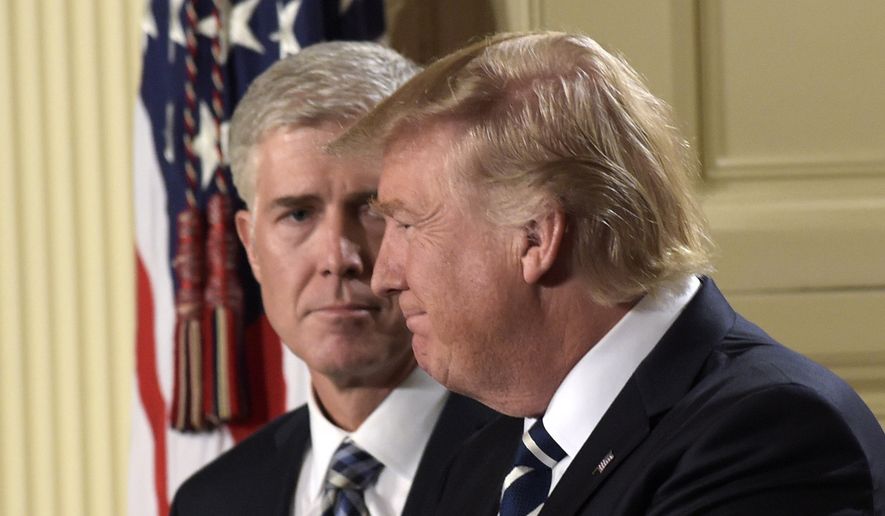Eleven years ago this week, Democrats made history by attempting the first — and to date only — partisan filibuster of a Supreme Court nominee.
Now, as President Trump names Neil Gorsuch to fill the empty seat on the high court, Democrats are once again grappling with making history, debating whether to mount yet another filibuster and perhaps trigger a showdown of monumental proportions.
Senate Minority Leader Charles E. Schumer wasted little time in laying down a marker Tuesday night, saying Democrats will filibuster Judge Gorsuch, requiring him to cross a 60-vote threshold.
“The Senate must insist upon 60-votes for any Supreme Court nominee,” the New York Democrat said in a statement just minutes after Mr. Trump and Judge Gorsuch finished speaking.
Tensions were already running high in Washington, with Democrats mounting blockades of many of Mr. Trump’s Cabinet picks and complaining about his spate of controversial executive actions. Republicans say Democrats are treating Mr. Trump worse than any other president in modern political history, while Democrats counter that Mr. Trump is different than any other president.
Still, Republicans insisted the Supreme Court debate should be an easy call. The GOP didn’t block either of President Obama’s first two picks, and they say Democrats shouldn’t hold up Mr. Trump’s nominations either.
Mr. Trump suggested Tuesday that his decision to put out a list of finalists for the job, then campaign on that list, gave him a mandate to have his pick confirmed.
But Democrats are torn.
They face pressure to filibuster from outside liberal groups, but they also fear setting a precedent that would make it easier for Mr. Trump to name more conservative justices over the next few years, tilting the court further to the right.
Filibustering now might push Republicans to trigger the “nuclear option,” a shortcut to changing the rules that would eliminate the 60-vote threshold for Supreme Court nominees.
Some Democrats say it would be a waste to force that fight now, over a nominee to fill the seat of the late Justice Antonin Scalia, because whoever replaces him won’t change the balance of the court. Instead, those Democrats argue, it’s better to wait for a later pick when Mr. Trump might try to replace one of the court’s liberal justices with a conservative.
Liberal groups were outraged at the “absurd” suggestion.
“At a time when urgent cases are pending regarding Trump’s bigoted, unconstitutional actions, it is simply unacceptable for any Senate Democrat to suggest confirming this nominee,” said Democracy for America, a leading lobby group.
Both sides are weighted by their own histories of obstruction.
It was Democrats who ushered in the era of Supreme Court fights with a 1987 battle over Judge Robert Bork. Democrats also launched partisan filibusters of President George W. Bush’s appeals court picks and tried to mount a filibuster against Justice Samuel A. Alito in 2006.
Both Mr. Schumer and Sen. Richard J. Durbin, his top lieutenant, were part of that filibuster attempt, which ultimately failed.
Republicans retaliated against Mr. Obama by filibustering some of his appeals court picks. Democrats, after insisting they wouldn’t use the nuclear option, reversed themselves and triggered the rules change, eliminating the 60-vote threshold for most nominees.
The only job they exempted was the Supreme Court, deeming it too important to leave to a majority vote.
Last year, when it appeared Hillary Clinton would win the White House and make the pick, top Democratic senators talked about eliminating the 60-vote threshold for the Supreme Court, too.
Now, with Mr. Trump making the nomination, Mr. Schumer says 60 votes is a must.
“This is such an important position that it ought to be bipartisan and mainstream in terms of the nominees,” said Mr. Schumer.
Republicans are grappling with the fallout from their yearlong blockade of Judge Merrick Garland, President Obama’s choice to fill the Scalia seat. Republicans refused to hold a hearing, much less a floor vote, enraging Democrats, who say the seat was “stolen” from them.
That’s fed calls for a filibuster.
“I intend to oppose the nomination, unless it is Merrick Garland,” said Sen. Jeff Merkley, an Oregon Democrat who used to be an ardent foe of filibusters but, now in the minority, has embraced the tool. “It is an illegitimate nomination unless it is Merrick Garland.”
Mr. Trump has said he wants Senate Republicans to be prepared for the nuclear option if Democrats filibuster.
“We have obstructionists,” he told Fox News last week.
Senate Majority Leader Mitch McConnell, Kentucky Republican, has been studiously noncommittal.
He said any questions about the nuclear option are speculative and won’t matter if Democrats follow precedent and allow an up-or-down vote.
“This is a beginning of a four-year term. This is not in the middle of a presidential election,” he said. “There have been Supreme Court appointments in the middle of the first term for Bill Clinton, for Barack Obama. None of those four nominees was denied an up-or-down vote.”
• Stephen Dinan can be reached at sdinan@washingtontimes.com.
• Seth McLaughlin can be reached at smclaughlin@washingtontimes.com.




Please read our comment policy before commenting.